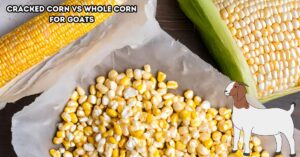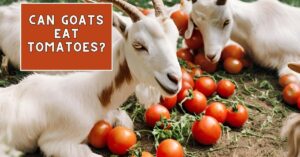People commonly used different kinds of grasses, weeds, and hay for the goats and cattle. Alfalfa hay is a grass that is used primarily for grazing purposes of animals. It is also called lucerne and belongs to the Fabaceae legume family. Forage alfalfa mainly grows in the United States, North Africa, and the United Kingdom. The flowers of this hay are small and have a purple color. The goats need 3 to 4 pounds of alfalfa hay per day.
Hence, can goats eat alfalfa hay? What are the pros and cons of feeding alfalfa hay to goats?
In this post, we will discover all the informative content about feeding alfalfa to goats, including its benefits and drawbacks. So, without wasting time, let’s get started!
Table of Contents
Can goats eat alfalfa hay?
Yes, alfalfa hay is a very healthy snack for goats. The goats love to eat alfalfa hay. Many essential nutrients and vitamins are present in alfalfa, which play an important role in improving goats’ health. It is a good source of protein and calcium, which are crucial for pregnant goats and their babies.
What are the benefits of feeding alfalfa hay to goats?
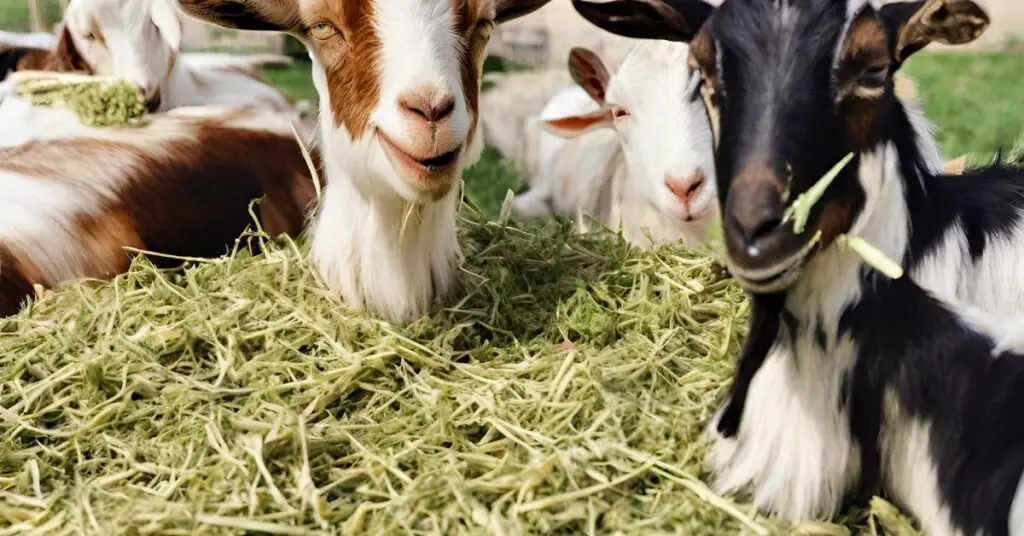
There is alfalfa hay, a healthy source of food for goats due to beneficial nutrients like proteins, vitamins, and calcium. So, let’s talk about the benefits of using alfalfa for goats.
- Alfalfa hay is the best source of calcium for goats. It helps make the bones and muscles of the goats stronger. Hence, the calcium content also benefits the baby goats’ development and growth. Supplementing with alfalfa hay is a good option if you lack calcium in your goats.
- When the doe starts lactating, they require a lot of protein and healthy nutrients compared to their regular feeding. Hence, alfalfa hay is the best source to meet the lactating doe’s requirement for protein content. However, only feed them a little alfalfa at a time; this is unhealthy for lactating dogs. Instead, use this treat for them only in small amounts and slowly increase consumption over time.
- You also need to increase the nutritional level of the pregnant female goat six weeks before the birth of the baby kid. Hence, alfalfa is the best food to increase the nutritional value of the pregnant goats’ feed.
- The goats have a very thin skin layer compared to other livestock and cattle. In the winter, the goats have difficulty meeting the climate changes. Hence, you need to feed them a good amount of forage. Alfalfa is the best hay or forage for them. The digestion of alfalfa produces bacterial fermentation in their rumens, which causes the release of heat and makes the goats warm. Hence, alfalfa is the best option to keep the goats warm on winter days.
- The alfalfa hay, with the necessary nutrients, is the best source for the goats’ diet. Calcium and phosphorus are both great for the goats’ balanced diet.
- Alfalfa hay contains a decent amount of vitamin C, K, and folate. These are all beneficial for the cellular and muscle growth of the goat’s body. They help the body produce new DNA and make the tissues strong. These also protect against the damage of free radicals in the goat’s body.
What is the risk of feeding too much alfalfa hay to goats?
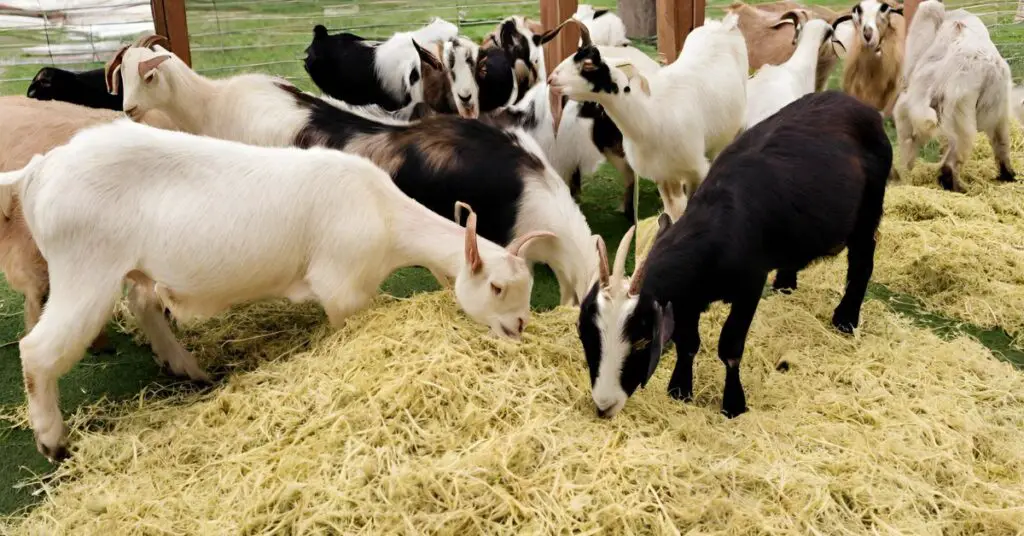
Alfalfa hay provides many nutritional benefits to your goats. But, on the other hand, you also remember that everything that can be used in large amounts is wrong for goats’ health. Hence, if your goats eat a lot of alfalfa, they probably suffer from several health problems. Some of these disorders are described below:
- The excessive use of alfalfa hay is terrible for goats in the initial stages of pregnancy. However, the overconsumption of alfalfa is also harmful for the lactating doe.
- The overfeeding of alfalfa also poses health risks to the dry does (the female goa is not lactating or pregnant). The large intake of alfalfa is also harmful for the bucks (the healthy goats).
- The goats get a lot of calcium from the alfalfa hay. However, calcium is bound by zinc. As a result, overuse of alfalfa hay produces goat body zinc deficiency, which causes a variety of health problems, including:
- Constant food spoilage
- Causes depression
- Causes loss of appetite
- Skin flaking
- Joint swelling and stiffness
- Foot pain
- Mouth foaming
- Hair thinning
- Wounds that heal slowly
The extensive use of alfalfa means getting a lot of protein content. The goats need a good amount of protein, but on the other hand, a high intake is also harmful to them. The high quantity of protein can be converted into urea. The kidneys in your goat’s body produce urea regularly. Hence, it is excreted from the goat’s body as urine. It also causes kidney damage in goats.
Can goats eat the alfalfa seeds?
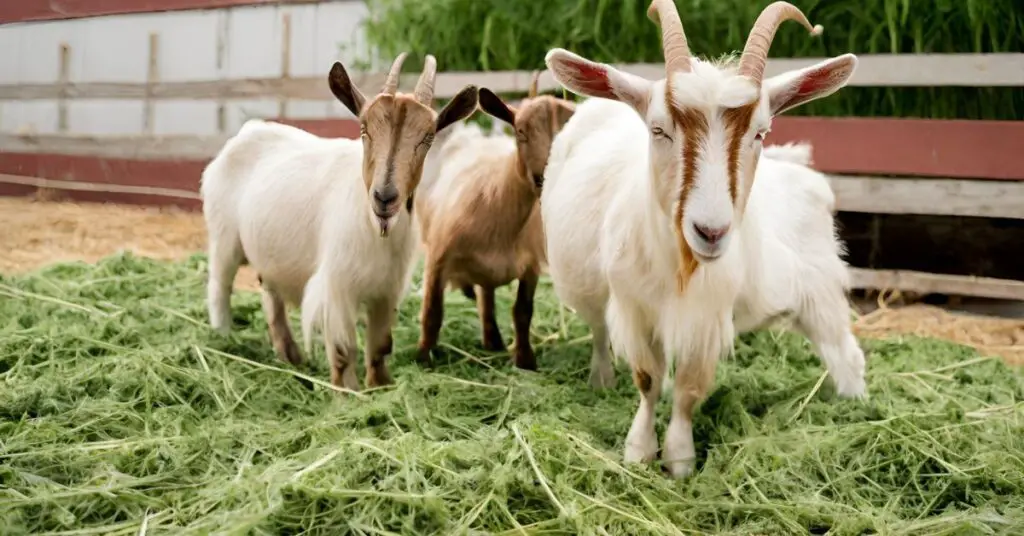
As I told you at the beginning of this article, alfalfa hay contains small purple flowers that become fruit over time. Then, this fruit of the alfalfa hay contains almost 15 to 20 seeds.
The goats enjoy eating the seeds of the alfalfa hay. These seeds are perfectly safe for them to eat. In other words, just as alfalfa contains many healthy nutrients, this hay’s seeds also have many vitamins and nutrients. But it would be best to always use this snack only as a treat.
Final thoughts
Alfalfa hay is the best forage for your goats in the winter or cold season. The balanced amount of this snack is also crucial for the health of lactating and pregnant goats.
FAQs:-
Can goats eat raw alfalfa?
Yes, they can! Many beneficial nutrients are present in them that are very helpful for the goats’ health.
How often can I use alfalfa hay for my goats?
You can only use this forage occasionally for your goats. As alfalfa hay is very expensive, you should serve it to your domestic goats in limited amounts.


